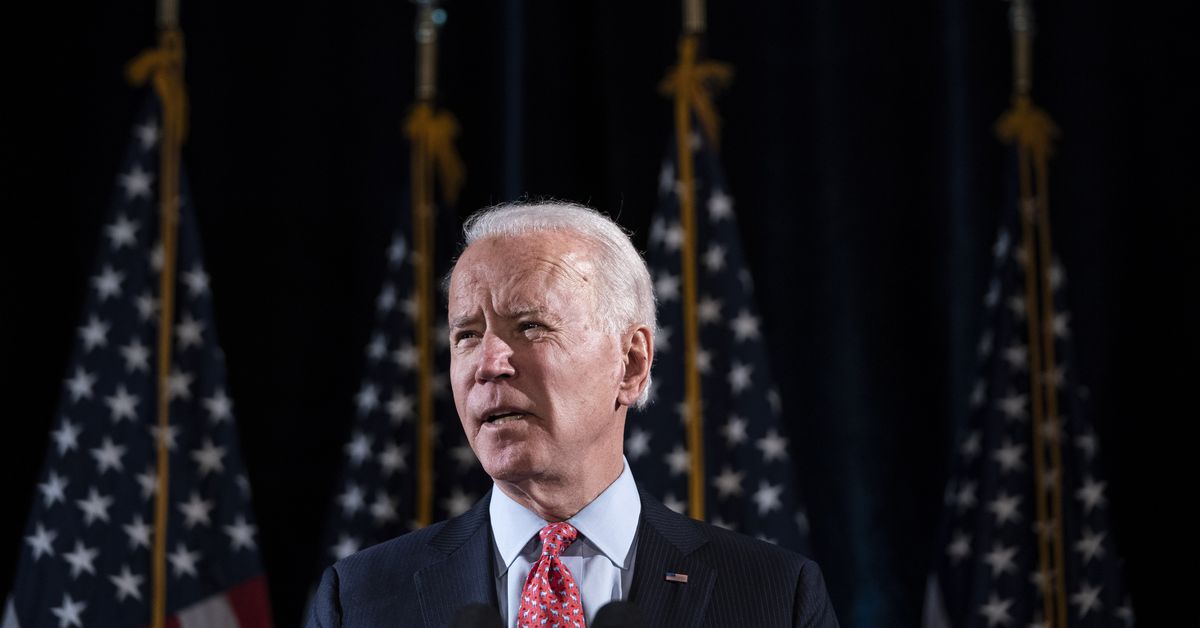
During a Friday interview on The Breakfast Club radio show, former Vice President Joe Biden made a controversial comment in an attempt to highlight his strength with black voters. “Well, I tell you what, if you have a problem figuring out whether you’re for me or Trump, then you ain’t black,” Biden said as he signed off from a conversation with show host, Charlamagne tha God.
“It don’t have nothing to do with Trump, it has to do with the fact — I want something for my community,” Charlamagne responded.
[embedded content]
Biden’s comment followed a wide-ranging interview, during which Charlamagne pressed him on everything from his implementation of the 1994 crime bill to his decision on a running mate.
His remark featured the presumptive Democratic nominee, a 77-year-old white man, attempting to determine blackness, and it prompted swift blowback on social media. Some prominent activists and writers of color questioned why Biden was effectively taking support from black voters for granted, and trying to judge who was black.
Somebody needs to tell Joe Biden that this comment to Charlamagne was a mistake.
Yes, Biden is a much better choice for black people than racist Trump.
But white people don’t get to tell black people what is black.
Biden still has to EARN our vote.pic.twitter.com/TPEV5ZpEYi
— Keith Boykin (@keithboykin) May 22, 2020
Aimee Allison of She the People on the Biden remark: “Being ‘not Trump’ is not good enough to inspire voter turnout. If he wants any chance of winning he needs to stop threatening us with Trump and start giving us real power,” starting w/ black woman as VP https://t.co/Z8hk0wlNGX
— Josh Jamerson (@joshjame) May 22, 2020
Looooong sigh. White politicians should probably refrain from defining Blackness for Black people. Just a thought.
— Adrianne Shropshire (@AdrianneShrop) May 22, 2020
Symone Sanders, a senior adviser for Biden’s campaign, later noted that Biden had made these statements “in jest” and reiterated that he was pointing out how his record compared to Trump’s. Biden, himself, also apologized for the remarks during a call with black business leaders on Friday afternoon, according to CBS News correspondent Ed O’Keefe.
“I should not have been so cavalier. I’ve never, never, ever taken the African American community for granted,” he said. “No one should have to vote for any party based on their race, their religion, their background.”
The comments made at the end of the Breakfast Club interview were in jest, but let’s be clear about what the VP was saying: he was making the distinction that he would put his record with the African American community up against Trump’s any day. Period.
— Symone D. Sanders (@SymoneDSanders) May 22, 2020
It’s unclear whether the exchange will have an enduring impact on the November election. But the interview highlighted how Biden has relied on support from black voters, without always thinking through what could alienate them. A concern over Biden’s comments centers on whether he can energize voters to go to the polls — and give them a reason to do so beyond opposition to the president.
Biden’s success in the primary was powered heavily by black voters
As part of Friday’s interview, Biden noted repeatedly that black voters were central to his success during the Democratic primary. “I told you, when I got to South Carolina, I won every single county. I won a larger share of the black vote than anybody has, including Barack,” he said.
In several key primary states, including South Carolina, Biden won overwhelmingly with black voters compared to Sen. Bernie Sanders (I-VT), though this support was stratified by age.
In the pivotal primary state of South Carolina, for example, Biden won 61 percent of black voters overall while Sanders won 17 percent. But across age groups, older black voters were more likely to support Biden than younger ones. For example, 38 percent of black voters under 30 backed Sanders, while 36 percent backed Biden.
Since he’s become the presumptive nominee, a recurring concern that’s been raised about Biden’s candidacy is whether he’ll be able energize a broader base of voters — including those who’ve been less enthused about him. Younger voters of color were among those who raised concerns about his comments Friday and are squarely in the group he needs to effectively reach.
Democrats, after all, will need higher turnout to win in this cycle, and black voters, whose turnout rates dipped from the 2012 election to 2016, are one of the key voting groups they have to connect with.
Biden’s statements on Friday indicated that he and his campaign are still wrestling with this issue.
Support Vox’s explanatory journalism
Every day at Vox, we aim to answer your most important questions and provide you, and our audience around the world, with information that has the power to save lives. Our mission has never been more vital than it is in this moment: to empower you through understanding. Vox’s work is reaching more people than ever, but our distinctive brand of explanatory journalism takes resources — particularly during a pandemic and an economic downturn. Your financial contribution will not constitute a donation, but it will enable our staff to continue to offer free articles, videos, and podcasts at the quality and volume that this moment requires. Please consider making a contribution to Vox today.
Posts from the same category:
- None Found









